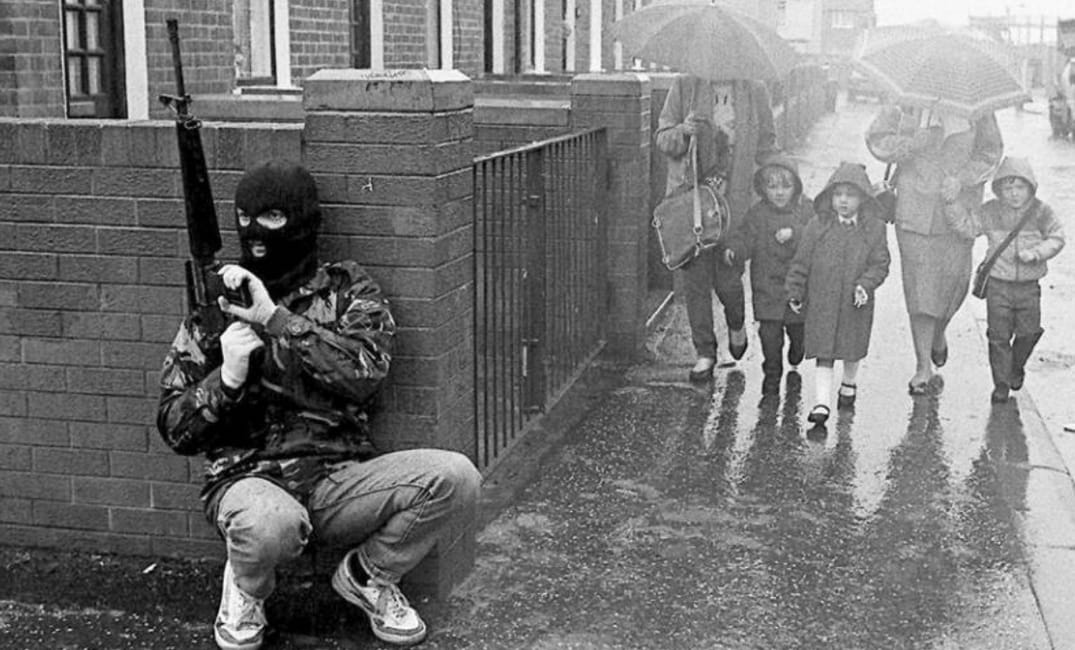By Jacob Smith
In July 2021, the government announced another – supposedly final – solution to the legacy of the conflict in Northern Ireland: a ‘statute of limitations’, which encompasses an amnesty for all ‘Troubles-related’ criminal offences and a halting of all civil justice and inquests, an oral history archive and a new information-recovery mechanism. Far from delivering much needed peace and reconciliation to the region, these plans show that the UK yet again is seeking to obscure the truth.

Support us!
Support us by contributing as little as £1 so we can continue to give young people a voice and a platform they deserve
£1.00
This generation (myself included) will not remember the height of the Troubles, generally seen as spanning from the late 1960s to the signing of the Belfast/Good Friday Agreement in 1998, but the conflict still raises issues to this day. Given this length of time, why are we still debating how to approach post-conflict justice in Northern Ireland and why, as Boris Johnson has suggested, do we not just ‘draw a line’ under the past? The truth is that the UK itself is to blame.
All parties to the conflict, namely loyalist and republican paramilitaries and the British state, have been accused of abhorrent crimes and human rights abuses during the conflict, including unlawful and indiscriminate killings, enforced disappearances and torture. The security services and the military have also been accused of complicity in the crimes of paramilitaries as a key aspect of its strategy.
But despite credible allegations and evidence being raised, victims remain waiting for truth and justice decades later. While criminal and civil justice for the crimes of paramilitaries has had some very limited success, the UK’s strategy over the past half-century has been to delay and disrupt any investigations that may shed light on its own shady practices. For example, in the case involving the killing of defence lawyer Pat Finucane – a case with ‘collusion at its heart’ – the UK has been repeatedly told by the courts that its investigations have been inadequate, but yet it still has not effectively investigated his death.
Even when cases do reach the court, the state’s response has been to consistently withhold evidence and obstruct justice. Yet now the government is seeking to justify the planned ‘statute of limitations’ due to the difficulty in obtaining redress through the courts. They are simply blaming the problem they have created.
But the solution instead may just be under the government’s nose. Despite being agreed by the UK at the time, and subsequently affirmed in January 2020 with the New Decade, New Approach Agreement, the 2014 Stormont House Agreement has (like many other international agreements under Boris Johnson’s government) since been reneged upon. This agreement sets out a different strategy for ‘dealing with the past’, which also includes plans for an oral history archive and an information recovery mechanism, but importantly leaves criminal and civil justice open – a key pillar of legality.
The benefits of the Stormont House and New Decade, New Approach agreements are not just in the substance, but can also be seen in their methodology. Rather than coming from the starting point of protecting veterans, and by extension the state, from credible allegations of serious crimes, the aim of these agreements were evidently to provide the transition to a peaceful future that Northern Ireland needs.
By their very nature, post-conflict societies require cross-community dialogue in order to create lasting peace and reconciliation, as those with a stake in the process must not be left excluded. For instance, the peace process in Colombia has failed to live up to expectations due to the lack of buy-in from some communities, rebel groups, and even the government. The UK’s unilateral amnesty and façade of a consultation leaves communities thinking that this is just another delaying tactic to obscure the truth, this time for good.
This is not to say that these agreements are perfect, and any new legacy proposal will undoubtedly spark at least some controversy, but they should be preferred to the unilateral and rushed suggestions the government prefers merely because they exempt the state and the military from any form of accountability.
It is time for Westminster to start taking the legacy of the Troubles seriously. Rather than seeking to push something through unilaterally, the only way for the UK government to create lasting peace and reconciliation is to collaborate and react sensitively to comprehensive cross-community consultation.
Thanks for reading our article! We know young people’s opinions matter and really appreciate everyone who reads us.
Give us a follow on Instagram, Twitter and Facebook to stay up to date with what young people think.

